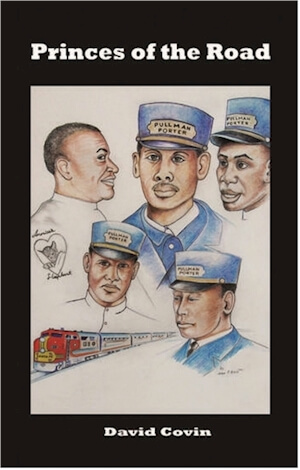Book Review: Princes Of The Road
Book Reviewed by Emanuel Carpenter
In David Covin’s Princes of the Road, the author transports readers to the 1930s of America, where Jim Crow and racism ruled. The central characters are the black porters who worked for the Pullman Company, primarily the soon-to-retire Deacon Judge and the smarter-than-he-seems Ezekiel James Jones. The story gets going when Deacon is propositioned by a woman at church he’s never met:
She reached into the small purse that hung from her neck on a chain. She fished out paper money and mashed it into his hand, pushing his fingers closed over it.
"I’m payin’ you this money. I hope it’s enough. I ain’t got no more." She spoke rapidly, "but if it’s not enough, jest look me up-here at the church- the next time you’s in Atlanta and, I swear, I’ll pay you the rest. Annie, Annie Flager’s my name.
The payment was for Deacon to help her son escape the treacherous South.
Deacon would have to hide the teenager as a stowaway on the trains. But with
police everywhere, the task is not an easy one.
A turning point in the novel is when readers get to know Ezekiel. The man
was smart enough to use his money to put his children through medical school
even though he speaks more like a slave. When he is propositioned by a vice
president at the railroad company, he gladly accepts. The VP says:
"The truth is—and this is what you must not let anyone know—we haven’t been able to penetrate their security at all. We don’t know a damn thing about what their goals are for the contract talks, or what their strategy will be. We don’t even know who will be the working men on their negotiating team.
Bottom line, the union can cost the railroad company a lot of money. So
much so that union men’s lives are destroyed once they’ve been discovered.
The VP lines Ezekiel’s pockets, and he sets off on a two-year expedition to
infiltrate the union and weed out the worst of them, especially since he
believes they are nothing but troublemakers anyway.
Princes of the Road is a good read. It takes you back to an uncomfortable
time when lynching was common, the South was considered evil and dangerous
for blacks, and African-Americans were second class citizens, if that. The
book also reminds of us of a time when porters were well-respected in the
black community for the decent wages they earned and the opportunity to see
most of the country on the company’s dime. We also learn of their private
lives (such as how many of them had women outside of their marriages in
different cities), ambitions (such as owning their own businesses), and even
superstitions.
The only downside to the book is that it sometimes gets mired in smaller
details that don’t necessarily advance the plot, which may leave readers
hoping at times that the pace picks up. It doesn’t take way from the overall
merit of the book since Covin’s prose is wonderful and his knowledge of
history is to be commended. Though this one is not quite the page turner as
his other work, Wimbey’s Corner, it’s still worth picking up and checking
out.

